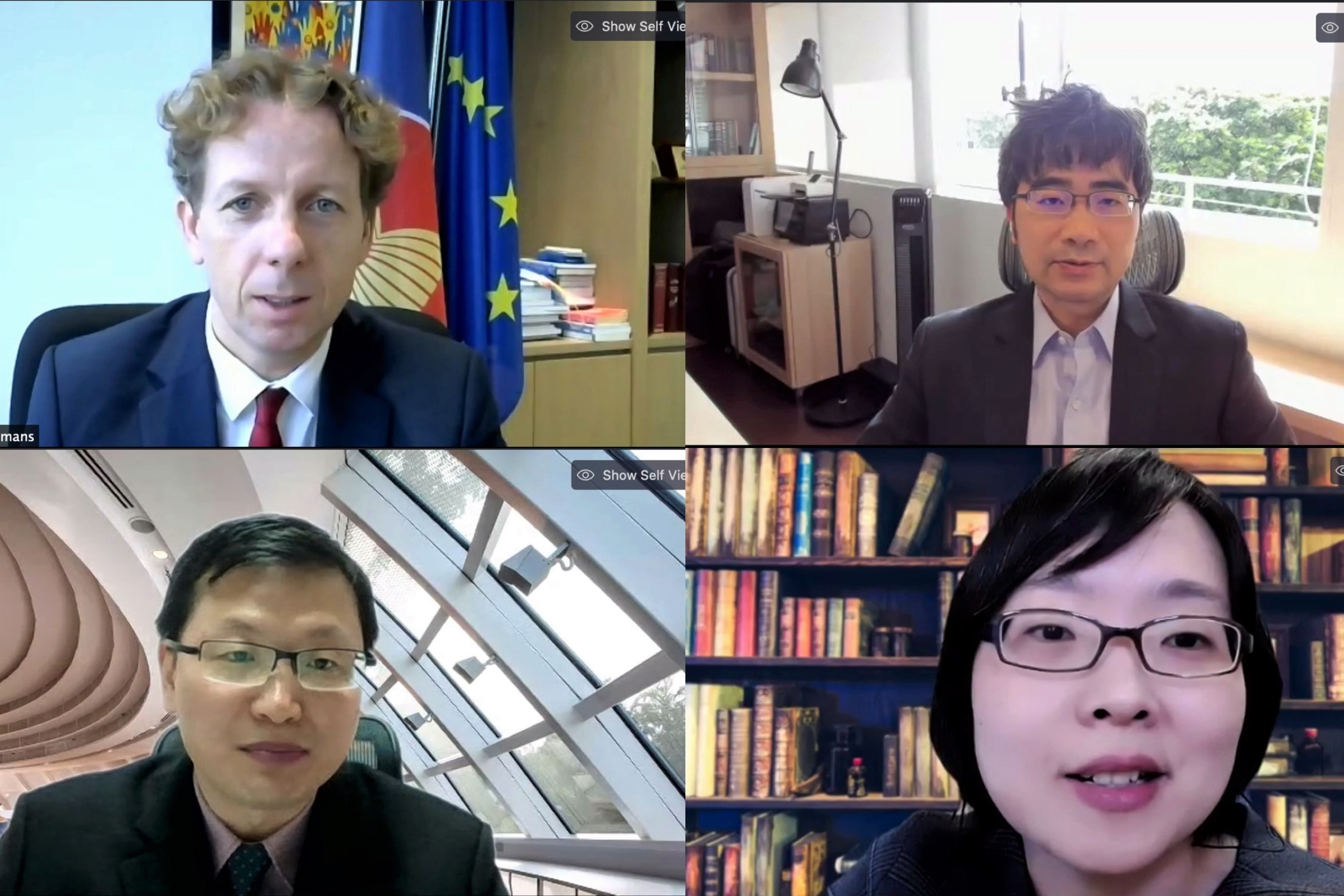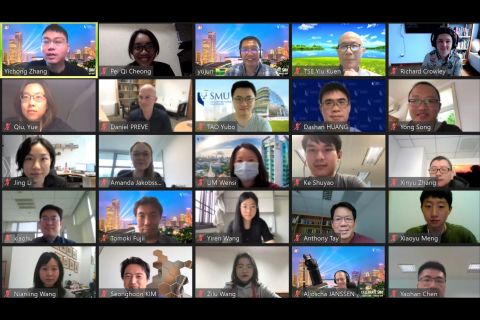
Top (left-right): Mr Igor Driesmans, European Union Ambassador to ASEAN; Professor Goh Yihan, Dean of SMU School of Law.
Bottom (left-right): SMU Associate Professor of Law Pasha Hsieh; SMU Assistant Professor of Law Dorcas Quek Anderson.
By Dexter Low
SMU Office of Research & Tech Transfer – Will a pandemic reverse the wave of protectionism that has swept across the globe in recent years? Such a prospect may seem incredible with global trade having fallen by over 30 percent this year, but the European Union (EU) and Association of Southeast Asian Nations (ASEAN) are determined to reach a different conclusion.
On 1 December 2020, the two multinational blocs achieved a diplomatic milestone after establishing a formal strategic partnership, paving the way for future cooperation on economic and security issues. Hopes are now rising for a crowning achievement which has remained elusive in recent years: solidifying a free trade agreement (FTA) between two organisations.
The numerous hurdles that remain to be overcome were discussed as part of the second ASEAN Law Conference held from 3 to 4 December 2020. The virtual conference, which examined the contours of a roadmap towards achieving an ASEAN-EU FTA, was organised by the Centre for Commercial Law in Asia (CCLA), which is a part of Singapore Management University’s (SMU) School of Law.
Mr Igor Driesmans, the EU Ambassador to the Southeast Asian bloc, sounded an optimistic note on the prospects of a closer economic engagement between the two sides. The recent upgrading of ties into a strategic partnership was already a political statement in the face of growing geopolitical insecurity and challenges to multilateralism, he argued.
“The EU and ASEAN will form a stronger bond. We do so in the defense of ASEAN centrality and a shared rejection of spheres of influence,” said Mr Driesmans, who hailed a shared commitment towards international cooperation via international rules and mechanisms.
“Future trade strategies of ASEAN and EU have profound global implications from both the legal and political perspective,” said Professor Goh Yihan, Dean of SMU’s School of Law, as he marked the start of the conference. With rising populism and protectionism – coupled with the current pandemic – a clear roadmap tapping on various disciplines like legal and political perspectives was now necessary to chart a way forward, he emphasised.
Rethinking trade negotiations
For Pasha Hsieh, Associate Professor at SMU’s School of Law, the previous failure to find a breakthrough on a FTA in 2009 between the two blocs warrants a rethink of the traditional approach towards trade negotiations based on so-called “pure” inter-regionalism, consisting largely of talks between two inter-regional bodies such as ASEAN and the EU.
At the other extreme is trans-regionalism where individual countries dialogue with each other directly. Instead, the EU has now adopted a “hybrid” process recognising the ability of countries within each bloc to act as standalone countries with their own interests. This approach has proven more successful, with the recent signing of FTAs between the EU and ASEAN members like Vietnam and Singapore.
For Professor Hsieh, examining the devil in the details of the agreements between EU and specific countries has provided useful insights into what a broader trading framework applying to both regions can look like. The contrasts between the trading needs of a developed country like Singapore and a developing economy like Vietnam provides important practical frameworks to develop into a broader inter-regional strategic partnership, he explained.
In the instance of the EU-Vietnam FTA, recognising the unique needs of a developing country meant adding in provisions to allow Vietnamese businesses to import much-needed secondhand medical devices and auto parts from Europe, Professor Hsieh said.
This flexibility extends to other areas that have benefitted both Vietnam and Singapore, like relaxing cumulation rules that require firms to have produced or a certain part of their product within their country, he continued. In the case of the Singapore-EU FTA, at least 40 percent of a product can be processed within the greater-ASEAN countries, a boon to import-reliant Singapore. In Vietnam, where the fabric industry heavily relies on imports from other countries, the EU FTA follows a more liberal rule and allows the importation of fabric from Korea.
Such provisions are ideal for wider expansion into a potential agreement as other ASEAN countries seek to jump on the bandwagon of exporting to the EU, with a template to integrate and account for the unique trading strengths of each national economy, said Professor Hsieh. “ASEAN and EU are the best examples of the concept of inter-regionalism because they are natural partners, with so called a common DNA,” he added.
Nudging mediation into the spotlight
But any prospects for further trade ties are moot without efficient mechanisms for resolving potential disputes between states and investors. Dorcas Quek Anderson, Assistant Professor of Law at SMU, hypothesised that new frameworks built on behavioral research can smooth out such conflicts before they escalate into potentially damaging and costly legal action or diplomatic bust-ups requiring third-party arbitration.
Studying the investment provisions of the EU-Singapore and EU-Vietnam Investment Protection Agreements, she found that the agreements have gone further than other international agreements in laying out clear and comprehensive mediation mechanisms before further legal escalation. “It doesn’t just give you a one liner to say ‘try mediation’, but it is supported by infrastructure contained in mediation mechanisms that include choice of mediator, timelines, what the mediator can do, as well as code of ethics for the mediators to comply with,” she said.
Professor Quek Anderson argued though that building on greater understanding about cognitive biases and nudge theory, agreements like a potential EU-ASEAN FTA can go further, by incentivising parties to mediate rather than depend on tried-and-tested strategies of arbitration. From simplifying the mediation process, which can make it more favorable compared to complex legal processes, to recommending it as a default option for dispute resolution to opt-out of, such nudges can become the lasting foundation for an effective, regional trading framework, she said.
“By designing the dispute settlement mechanism such that future disputants, investors or state officials are nudged to use mediation early, mediation could become the default way of resolving disputes,” Professor Quek Anderson concluded.
Back to Research@SMU Feb 2021 Issue
See More News
Want to see more of SMU Research?
Sign up for Research@SMU e-newslettter to know more about our research and research-related events!
If you would like to remove yourself from all our mailing list, please visit https://eservices.smu.edu.sg/internet/DNC/Default.aspx

